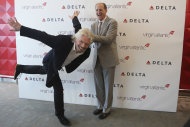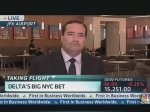WASHINGTON — Howard Wolfson, the 2008 communications director for Hillary Rodham Clinton, has said he will not return for a 2016 presidential campaign. Neither, for that matter, will Neera Tanden, the campaign's policy director. Ditto for Mark Penn, the chief strategist, and Patti Solis Doyle, the embattled campaign manager.
As core members of a dysfunctional "Team of Rivals," these top advisers were seared, scattered and, to different degrees, forged by the 2008 experience. Haunted by the failures in management and messaging, they have worked hard to get over their shattered White House dreams and rejection by a Democratic base enamored with Barack Obama. They express their requisite hope that Clinton will run and win, but also their lack of interest in jumping back in.
ADVERTISEMENT


Clinton, who declined to be interviewed, moved on more quickly than many of her senior staff by going to work for Obama as secretary of state. She refuses to acknowledge the 2016 speculation but has privately suggested that the obstacles to running aren't exactly insurmountable. "She did tell me once that she was really thinking about Chelsea and [son-in-law] Marc," said Susie Tompkins Buell, a Democratic donor and friend of Clinton, "and how she didn't want to disrupt their lives."
The 2008 campaign did precisely that to many of Hillaryland's denizens. It was a campaign structure that pitted an "A team" of advisers against one another and created a climate of anxiety as a "B team" of potential outside replacements from the Clintons' White House and Senate orbits hovered.
Now, as Clinton repositions on issues such as gay marriage, reconnects with donors and crowds out potential rivals, the nearly two dozen veterans interviewed for this article debated who among them could or would come back. That spotlights an overlooked consideration for Clinton: With the former core team apparently intent on staying out, can Clinton rebuild an inner circle capable of running and winning a presidential campaign? Will she reach into the tightknit Obama machine for talent, again borrow from her husband's brain trust or elevate the understudies?
Philippe Reines, one of those former Senate loyalists who followed her to the State Department and is now a paid spokesman for the former first lady, dismissed speculation about a 2016 run even as he pronounced that Clinton "would be a great president and I would want to help her do that." He also contacted veterans of the '08 campaign and urged them to avoid anonymous sniping that would reflect poorly on Clinton, according to several people who've been on the receiving end and who took the request as a warning not to criticize her. (Reines denied that he policed anyone's conversations and insisted that he only encouraged former staffers to put their names to any comments.)
He and other boosters sought to put the lingering leadership concerns to rest by pointing to Clinton's relatively smooth tenure as secretary of state. But even he acknowledged that running an existing bureaucracy is not analogous to building a billion-dollar campaign. That leaves Clinton with only one model as a reference point if she runs for president in 2016. "I can go into the plus sides of the theory of the Team of Rivals and the downsides of the theory of the Team of Rivals, but I don't want to do that," Solis Doyle said. She explained that the past was too painful and filled with "so many" traumas.
"Yeah," she added, "PTSD."
Wolfson abroad
After Clinton conceded the Democratic nomination in the summer of 2008, the famously aerophobic Howard Wolfson swallowed some anti-anxiety pills and boarded a flight to Britain. While abroad, he also continued to get over his attachment to the Democratic Party.
This was a remarkable development. A former executive director of the congressional committee to elect Democrats, Wolfson was once the driving force of the New York Democratic Party. In 2005, he labeled as traitors the Democratic supporters of Mayor Michael Bloomberg -- a social liberal who was then running as a Republican. He successfully helped to lead the effort to quash Bloomberg's push for nonpartisan elections.
For Wolfson, parties mattered. And Clinton mattered. She was the party's presumptive nominee and his ticket to the White House.
The fall of 2007 proved especially painful for Wolfson. A disastrous Oct. 30 debate for Clinton in Philadelphia eroded her invincibility. Three days later, Wolfson's mother, who raised him as a single parent, died at age 62. There were later episodes that led Wolfson to describe the atmosphere as a "toxic bath," the most infamous of which involved his deputy, Phil Singer, who one day in 2008 stormed out of the war room after screaming obscenities at the Team of Rivals "cabal" from atop a chair.
After Clinton's concession in June 2008, Wolfson joined Fox News as a contributor. Bloomberg, the self-made billionaire who by then had shed party affiliation altogether to become an independent, was seeking a controversial third term as mayor. In potentially luring Wolfson, Bloomberg's associates saw an opportunity to both sign a talent and prevent a proven foe from working for mayoral rivals. After returning to the States, Wolfson met with Bloomberg's right-hand man, Kevin Sheekey, at a midtown pub.
"You know, I've said a lot of negative things about Mike Bloomberg," Sheekey recalled Wolfson saying. When Sheekey asked what Wolfson now thought of the mayor, the former partisan answered, "He should be reelected and the city needs him."
"If you say that to Mike Bloomberg," Sheekey concluded, "we're not going to have a problem."
The mayor's progressive positions on key social issues such as gun control, climate change and gay rights made Wolfson's transition away from the Democratic fold much easier. So, no doubt, did other enticements. At the time, Bloomberg was throwing vast amounts of money at Democratic operatives.
Now, as Bloomberg's powerful deputy mayor for government affairs and communications, Wolfson has embraced Bloomberg's disdain of party politics and pushed the kind of transactional politics that puts results over ideology. Wolfson has taken to saying of Bloomberg that "he is the only major political figure in America operating outside the two-party system, and as a result, he sometimes makes decisions that partisans don't understand."
Wolfson also runs Bloomberg's well-funded Independence USA PAC and is expected to continue to do so after the mayor leaves office. The mayor has said he would use his PAC, and by extension, Wolfson, to reward any politician who bucks his party on issues dear to Bloomberg. That means that the man once responsible for championing Democrats in Congress will be spending Bloomberg's money to reelect Sen. Patrick J. Toomey, R-Pa., who opposes gay rights and has advocated prosecuting abortion providers, but has stuck his neck out to support background checks on guns.
The famously neurotic Wolfson, who declined to comment for this story, is now described as unusually well-adjusted. He has traded his sweater vests for sharp suits and needles reporters about their shaggy hair. The 46-year-old lives in his beloved New York, finally residing full time in the same city as his wife, Terri McCullough, the former chief of staff to Nancy Pelosi, and their young children. As deputy mayor he has a broad portfolio, defending right-leaning stop-and-frisk police policies and denouncing Occupy Wall Street; he also spends many Fridays in the White House strategizing with other gun-control advocates. The slimmed-down face of bike lanes, Wolfson is such a regular at Manhattan's Nobu that Drew Nieporent, the owner of the pricey Japanese restaurant, credits him with "sending my kids through college."
For Wolfson's birthday last week, Bloomberg co-workers celebrated by giving him helium balloons featuring Muppet characters -- a Wolfson calling card since, as a young congressional aide, he helped devise the Bert-and-Ernie campaign to defeat Republican efforts to end federal subsidies for public broadcasting. But he has expressed little desire to return to the partisan battles of Washington or, for that matter, another campaign for the party's presumptive standard-bearer, Clinton.
"He says no," said Bradley Tusk, who ran Bloomberg's reelection campaign.
Tanden at American Progress
The Clinton campaign proved equally clarifying for many of its veterans all along the Democratic continuum.
In her office at the Center for American Progress, where she is president, Tanden displays two framed photos behind her desk. One, of Clinton with her arm slung around Tanden, reads: "From the White House to the Senate and beyond . . . Thanks for all you do for me. I couldn't have done it without you. Hillary." The other shows Clinton's former policy director laughing alongside Obama.
"On health care, on economic issues, she was the progressive voice in the presidential campaign," said Tanden. She added, quietly, "We became the status quo campaign."
Unlike many progressive Clinton alumni who had a hard time moving on after Clinton's defeat and held a grudge against Obama, Tanden joined the Obama team and played a key role in the passage of health-care reform. During that time she occasionally exchanged e-mails with Clinton. Since leaving the administration, she has become a consistent thorn in the administration's left side as a leading progressive voice.
She seems to enjoy the freedom of being unshackled from a campaign or candidate. She said that while her think tank would be a resource for progressive candidates, she had made a long-term commitment to her board and did not foresee herself being involved in a Clinton 2016 bid. "I'm not planning on working for her," she said.
While not as definitive, Wolfson's former deputy, Phil Singer, has also moved on, but to the center. The once famously volatile operative now describes himself as a believer of "constructive engagement." Founder of Marathon Strategies, he represents such liberal bogeymen as Wal-Mart. He also is an adviser to New York Gov. Andrew M. Cuomo, D. The governor is criticized for many things, but neglecting to exercise control is not one of them. With Singer's help, he has established himself as ruthlessly pragmatic and effective -- the very traits missing from the Clinton operation.
Cuomo is widely believed to harbor White House hopes for 2016 -- but only if Clinton does not run. Singer dutifully deflected speculation, adding, "I think he'd be a very good president."
Penn a symbol
The crash-landing of the Clinton campaign dispersed its leaders across the political spectrum. But it might have driven her chief strategist and President Bill Clinton's former pollster out of politics altogether.
Mark Penn symbolizes the doubts many Democrats have about whether Hillary Clinton can shake her association with the triangulation that defined her husband's White House.
One of the great questions inside the Clinton diaspora is how much, if at all, the 2008 loss damaged Penn's relationship with the couple.
"I never tell anybody," said Penn, now a senior executive with Microsoft.
Penn has been tagged as the egocentric villain of the campaign who sowed seeds of dissent in the Team of Rivals. One campaign staffer recalled Penn exiting his office, extracting all of the pens from a colleague's mug, returning to his office and closing the door.
The vast majority of the former Clinton aides -- many of whom spoke on the condition of anonymity out of fear of upsetting the powerful Clintons -- believed that it was impossible for Penn to rejoin an eventual campaign.
"If you are the losing team," Penn said, "you get blamed. Hillary told me, 'It comes with the territory.' " He said that he and the candidate had a "thorough post-discussion of everything" but wouldn't divulge specifics. He admitted, though, "You are always a little bit haunted when something is lost."
He said that he has had civil conversations with former colleagues, including frequent antagonist Mandy Grunwald, a media consultant for the 2008 campaign who has since worked on several Democratic Senate races; Grunwald declined to comment for this story. "We had a particularly nice talk at the funeral of Hillary's mother," Penn said.
He acknowledged that changes in his relationship with the Clintons were inevitable. "Look, I got to serve for kind of six years as one of the closest advisers to the president, so it's different. It's different . . . after you are not one of the closest advisers," he said. Asked whether he felt they would welcome him back for a 2016 campaign, he added, "You would have to ask them."
Penn's desk in his K Street corner office in D.C. is custom-made with airplane parts. It reminds him, he said, of his goal of "taking off." Among the items on his trophy walls: A photo of Penn with Bill Clinton, a signed copy of one of Clinton's State of the Union addresses, and a "Clinton Acquitted" front page. Conspicuously missing is any evidence of his role in Hillary Clinton's 2008 campaign.
They have, however, seen each other elsewhere.
One attendee at a December 2011 event at the Newseum featuring Clinton reported overhearing Huma Abedin, a close aide to the then-secretary of state, admonishing a member of Penn's entourage that "we should have been notified that he was going to be here." (Abedin responded: "I'm 100 percent sure this didn't happen.") Yet in July 2012, Clinton accepted his invitation to speak at a Holocaust Museum event organized by Penn's former firm.
And Penn suggested he still works closely with Bill Clinton, lending a hand with the speech he gave at the Democratic National Convention in September. "If I helped President Clinton in that speech with an idea or two, that's what I do," he said, adding that he believed the former president "has always and continues to always regard my work extremely well."
At the beginning of the year, Penn sought to enlist Clinton for a Microsoft promotion linked to the State of the Union address. He declined, according to a person with knowledge of the pitch. "We got Jimmy Carter," Penn said.
At a conference late last month at the Corcoran partly sponsored by Microsoft, Penn paced in the lobby and waited in the wings before the headliner, Clinton, arrived. A person close to Clinton insinuated that Penn tried to see the former president but was rebuffed by Clinton's advance team. Penn called that account "false," saying he had to leave early for a lunch with Washington Post executives. Clinton's team later explained that a scheduling conflict prevented a meeting.
Penn keeps his preferred childhood board game -- "Consensus, A Game of Electoral Strategy" -- next to his desk, and said he still believes Hillary Clinton would make a great president. But the creator of her famous "3 a.m." ad, touting her preparedness for the Oval Office, said politics are not in his future. "I'm doing something completely different," he said. "My passion for technology actually predates my passion for politics."
Asked what he had learned from 2008 to help him in his new job, which includes formulating Microsoft's negative ad campaign against Google, he said: "You look at how people responded to the 3 a.m. ad in 2008 and I see how they are responding to something like the Scroogled campaign that we are running. And you see that in many ways America responds to a good question."
Solis Doyle moves on
A few weeks ago, Patti Solis Doyle spoke about the role of women and Hispanics in politics in her keynote address at Northwestern University's distinguished alumni weekend. The woman who coined the word "Hillaryland" also talked about getting fired as Clinton's 2008 campaign manager and putting her life back together.
"My own career trajectory paralleled Hillary's career trajectory," said Solis Doyle, alternately sipping green tea and Diet Coke at the Tabard Inn here. "Of course I talk about it. It's my story."
As manager of a campaign that is universally acknowledged to have been a management catastrophe, Solis Doyle has a zero-sum problem. Either she is to blame for failing to impose order or Clinton is. Clinton's backers consistently say she addressed this concern at the State Department by deploying Cheryl Mills, another longtime aide, as an effective enforcer.
Several Clinton insiders urged Solis Doyle not to accept Clinton's offer to run the 2008 presidential campaign. Others said that when Clinton's candidacy faltered, the staff looked for leadership, but some said that Solis Doyle did not step up, describing her as invisible. In a February 2008 e-mail, Clinton effectively "disappeared" her.
"It's a huge hit to your psyche and emotions. And then a layer on top of that to be replaced. Yeah, I don't know what stronger word to use than devastated. I was devastated," Solis Doyle said, adding that she understood that "the campaign needed to be shaken up, and I got shook up and I take responsibility."
After a controversial stint on the Obama general election campaign ("I needed to prove that I wasn't incompetent"), Solis Doyle joined the law firm of the campaign's counsel as a lobbyist in 2009. She said she helped bring in some clients but had no taste for the business. She set up Solis Strategies, though she no longer has any clients there and uses the outfit mostly as a way to get paid for a dozen or so speaking engagements a year. She said they bring between $5,000 and $10,000 a pop, and occasionally $20,000. She joked about the fees she might have attracted if things had gone better for Clinton: "I'd be making $50,000 for speeches instead of $10,000 for speeches."
Two years ago she co-founded a financial firm called Vendor Assistance Program, which advances businesses money owed to them by struggling state governments; VAP then profits from late fees when the businesses are reimbursed. "I'm the president of a finance company. You know, what the hell!" she said. "I had no idea I'd ever be a successful entrepreneur, but it seems to be happening."
She said she remains close to Tanden and Wolfson, and occasionally bumps into Penn and Grunwald at Sidwell Friends, where their children go to school. She says they are polite to one another. Solis Doyle said that she received a note from Hillary Clinton when her mother died and that she sent a note when Clinton's mother died.
"I haven't seen her since, wow, February of '08, maybe?" she said. "I think this is true of everybody who worked on that campaign, including her. You learn from your mistakes. If she should run again -- and again I don't know -- I hope she does. I think she would learn from her mistakes."
Solis Doyle said that she found the prospect of another Clinton presidential run "even more exciting" this time around. But she expects to be otherwise occupied with her new business ventures. Working for Clinton is not in the picture, she said. "I'm just not doing that."
She did, however, offer her former mentor one bit of advice.
"She shouldn't run as a front-runner."





















































































LATEST COMMENTS